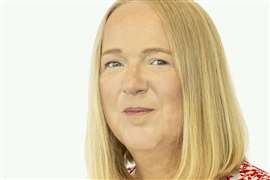GAM’s Carlos Araoz explains the company’s internationalisation strategy
22 December 2010

With a 20 year career as a management consultant behind him you would expect Carlos Araoz, GAM's chief operating officer, to be fluent and persuasive. Even in English - not his first language - he rattles away at a remarkable speed. So fast, indeed, that translators at the recent Europlatform conference found it impossible to keep up.
Speaking to IRN at GAM's spartan offices in central Madrid, after a tiring, all-day board meeting, Mr Araoz's enthusiasm for business is undimmed, even as he describes just how bad the Spanish market has become.
"The biggest challenge for Spain is if, how or when the country runs out of money", he says, "The government doesn't know." He highlights the unemployment issue - 20% and rising - and says there is a prospect that construction as a whole, already 50% down from the peak, could drop a further 10 to 15% over the coming 18 months. A flat construction market is the best that can be hoped for.
For GAM, which still has 50% of its business in Spanish construction, this means that conditions at home remain very difficult. Of its construction activity, around half is in public works (split evenly between roads and railways) and half is private, including industrial-related construction work. On the all-important public work, he is more worried about spending on roads than on railways; "With trains, once they start it's difficult to stop. On roads, I am a lot more fearful."
Despite this gloomy backdrop, Mr Araoz manages to sound an optimistic note; "The underlying economy - I actually believe it - is getting much better. You don't see it in GDP, which is dominated by construction. General activity is holding; the banks are holding. We got new credit lines in May; in January that would have been impossible."
Even so, it is a crisis, and GAM's response has been an exaggerated version of what many other rental companies have been forced to do. Its Spanish workforce has dropped by over 40% from 2800 to 1600; costs are 40% lower; and investment in fleet - of course - has been at the bare minimum.
Having taken these measures, Mr Araoz says the company is starting to regain some of its stability. He says revenues will be on budget this year at around €260 million, which is just 7% down on 2009 compared to the 25% fall between 2008 and 2009 (revenues peaked at €365 million in 2008). Its Spanish construction revenues are budgeted to fall by around 18% this year.
He claims that a recent price increase strategy in Spain has been successful, and he chides competitors for not following suit. (Mr Araoz is not scared of being rude to his competitors - in his presentation at the Europlatform conference the day after the interview he tells the audience that many Spanish rental companies are little more than government employment agencies.)
There is no doubt that the company has reacted to the recession in an aggressive and fairly adventurous way, in particular by starting up rental businesses in 14 countries outside Spain, including such ‘unlikely' candidates such as Columbia, Morocco and Iraq.
However, its response started first in Spain, where it has launched a range of ‘specialist' rental services to offset the decline in construction. These will represent around 30% of revenues this year and include sectors like power, ports, events, groundscare equipment and industry.
Mr Araoz says these specialist businesses will grow by 25% this year, excluding the collapsed wind turbine market, where GAM's revenues have fallen from €20-25 million a year to nearer €3 million.
More eye-catching, however, is the international push, which in the last two years has seen the company open up in Portugal, Bulgaria, Romania and Poland, followed by Mexico, Brazil, Peru, Panama and Saudi Arabia, and more recently in Chile, Columbia, Morocco, Senegal and Iraq.
These international businesses are projected to give revenues of €46.9 million this year (of which around €17-18 million comes from Portugal), almost double the 2009 figure. GAM originally set itself the target of reaching €100 million in international revenues by 2013, but Mr Araoz says that "at the moment, I believe that we will be very close to making that 2013 number next year."
The basic strategy is to enter markets that have some kind of cultural or business affinity with Spain and that have big infrastructure spending plans. As Mr Araoz puts it; "Countries that are rich enough to have big infrastructure plans, but poor enough not to have any equipment...We chase infrastructure programmes."
There is also a very particular approach to establishing the businesses. They use GAM staff to manage the businesses and frequently set up next to construction sites rather than traditional city locations.
"We don't go to cities", he says, "We go to construction sites, where roads and bridges are being built. In the markets where we are going to construction sites we're making money from day one. When we start in cities it takes us eight months to make money."
He describes the model for these start-ups - somewhat tongue-in-cheek - as ‘guerrilla rentals', meaning that there is a low-cost infrastructure; "We put in a small depot by a site and test the market - test the prices, the payment terms", he says. (At Europlatform the next day he amplifies this message by calling for renters in general, and the powered access market in particular, to employ a "thrifty thrifty" rental model.)
If eastern Europe is proving difficult (the three businesses there will turnover around €8 million this year and Mr Araoz says "we have not found the key to making money in Eastern Europe"), Mr Araoz reserves most of his enthusiasm for Brazil, Mexico and Panama, where the company will generate revenues of around €18 million this year.
Columbia (in Bogota) and Chile (Santiago) are the latest market entrants in the region, while the new depot in Erbil, in Kurdistan in the north of Iraq, will help the company tap into infrastructure and oil and gas work in Iraq and, eventually, Turkey as well, where a depot is also planned.
The machines in these international operations are mainly mid- and large-sized models, with aerial platforms taking up as much as 50% of the US$200 million valued fleet. Excavators, for example, go up to 30 t, and heavy compaction machines are also included. Mr Araoz says that 70% of this equipment comes from its Spanish operations while the remainder is acquired second hand at auctions or other sources.
"Aerials are a great product", he says, "They can be rented anywhere, even on a canal." This is a reference to the massive Panama Canal project where GAM equipment is working. The company has five 43 m JLG 1350 big booms in Mexico alone.
In several of these markets GAM supplies aerials with an operator - there are 185 such operators in Mexico, for example, employed as contract workers rather than full-time GAM staff.
This low-cost approach helps explain how the company has managed to set up in so many countries in such as short time. Managers are Spanish GAM staff, and mechanics from Spain take turns to spend a month or two in the various new business locations.
With so many openings in so short a time, there has to be a limit on where the company will go. Mr Araoz says the big developed markets like US are not on the cards (although he says a small depot in San Antonio - an offshoot of its Mexican operation - might be interesting one day) and neither is a big potential market like India, because there are so few English speakers at GAM.
Some European rental executives are still to be convinced of the long term viability of the GAM project, and see the international businesses as something of a sideshow to the main event, which is the continuing crisis in Spain.
For the ever-persuasive Carlos Araoz, however, the move overseas is just the natural thing to do; to follow the money. "If you sit in your home market then you will not get out of the hole...You have to do more than just ‘hang in there'."


